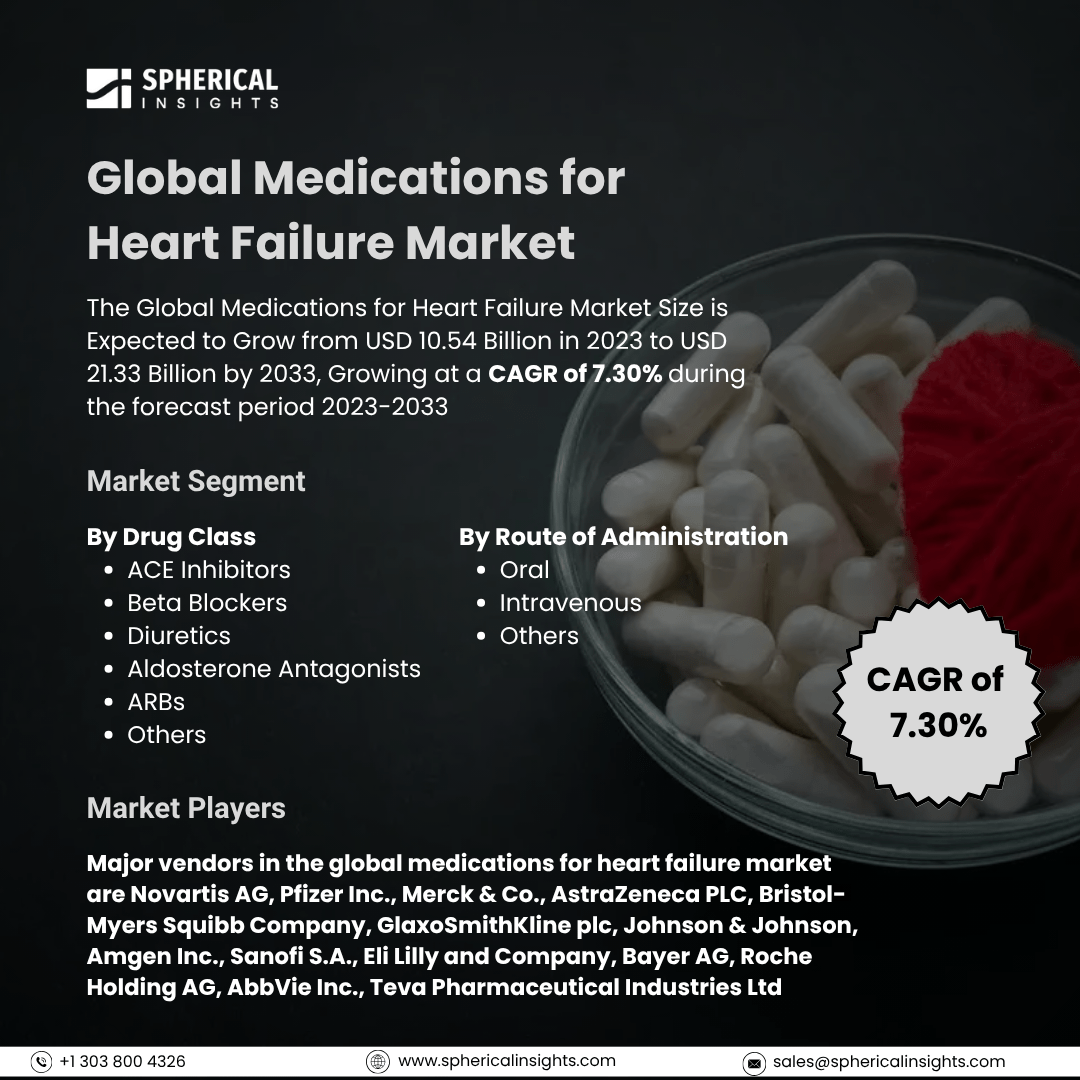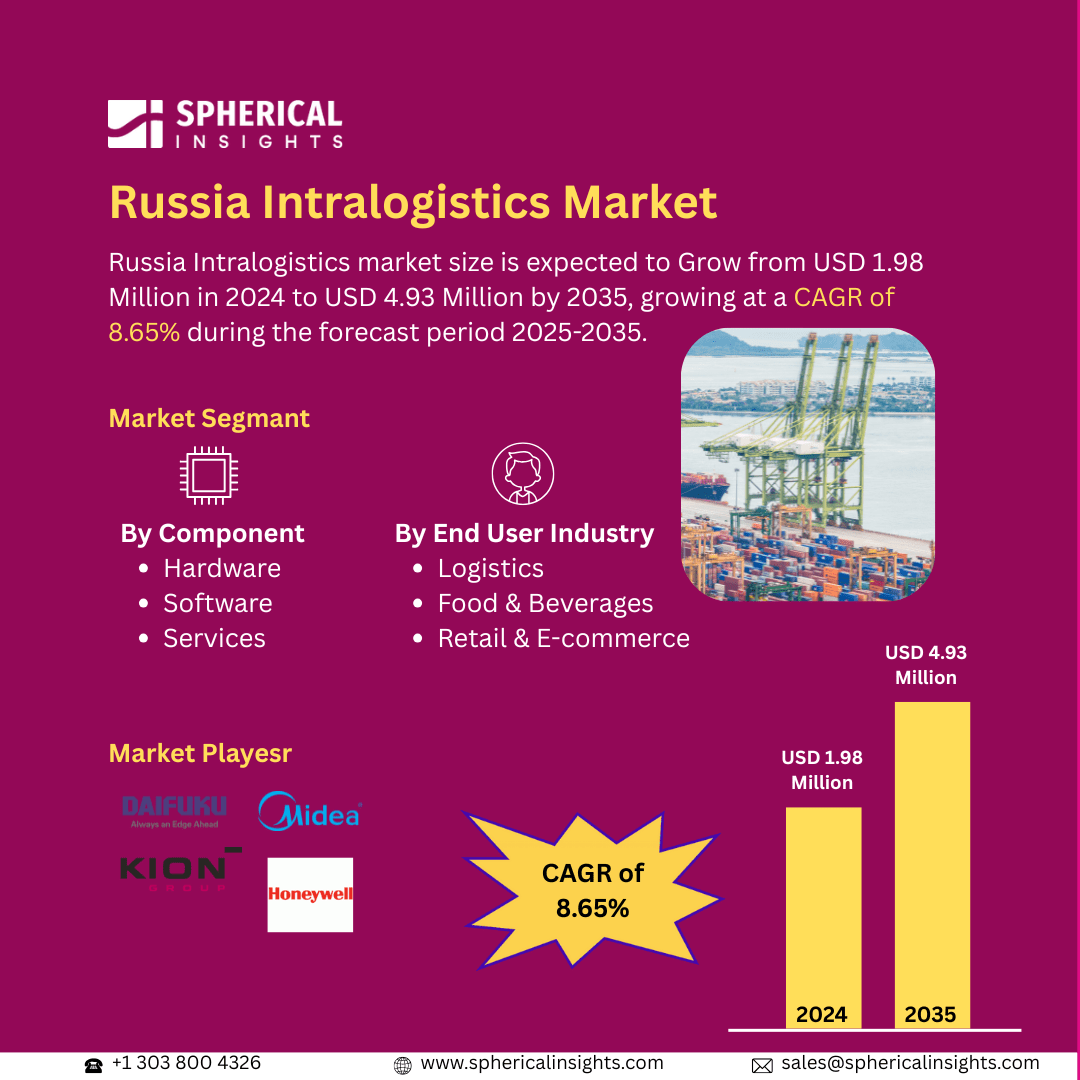Global Medications for Heart Failure Market Size To Exceed USD 21.33 Billion By 2033
According to a research report published by Spherical Insights & Consulting, The Global Medications for Heart Failure Market Size is Expected to Grow from USD 10.54 Billion in 2023 to USD 21.33 Billion by 2033, Growing at a CAGR of 7.30% during the forecast period 2023-2033.
Browse 210 market data Tables and 45 Figures spread through 190 Pages and in-depth TOC on the Global Medications for Heart Failure Market Size, Share, and COVID-19 Impact Analysis, By Drug Class (ACE Inhibitors, Beta Blockers, Diuretics, Aldosterone Antagonists, ARBs, and Others), By Route of Administration (Oral, Intravenous, and Others), and By Region (North America, Europe, Asia-Pacific, Latin America, Middle East, and Africa), Analysis and Forecast 2023 - 2033
The international medications for heart failure market refers to the business focused on the production and distribution of drugs designed to manage and treat cardiac failure or symptoms. These medications aim to improve heart function, reduce symptoms, and enhance the quality of life for patients with heart failure. The key driving factors are the increasing prevalence of cardiac failure in the elderly population, advancements in pharmaceutical research, and key market players. Additionally, sedentary lifestyle-related diseases like diabetes and hypertension contribute to heart failure, which requires more medication. Further, government focused on novel drugs and medications, with key market players propelling the market expansion. However, the high cost of medicine might take this away from the low and middle economic classes, which restricts their wide adoption.
The beta blockers segment held a significant share of the global medications for heart failure market in 2023 and is predicted to grow at a rapid pace over the forecast period.
On the basis of the drug class, the global medications for heart failure market is divided into ACE inhibitors, beta blockers, diuretics, aldosterone antagonists, ARBs, and others. Among these, the beta blockers segment held a significant share of the global medications for heart failure market in 2023 and is predicted to grow at a rapid pace over the forecast period. This segment growth is driven by lowering the heart rate and blood pressure, and these drugs help the heart work effectively by minimizing oxygen need.
The intravenous segment accounted for the largest share of the global medications for heart failure market in 2023 and is predicted to grow at a notable CAGR over the forecast period.
On the basis of the route of administration, the global medications for heart failure market is divided into oral, intravenous, and others. Among these, the intravenous segment accounted for the largest share of the global medications for heart failure market in 2023 and is predicted to grow at a notable CAGR over the forecast period. This segment growth is driven by providing immediate treatment of sudden cardiac failure with signs and symptoms.
Asia Pacific is expected to hold the highest share of the global medications for heart failure market over the forecast period.
Asia Pacific is anticipated to hold the highest share of the global medications for heart failure market over the forecast period. The regional market growth is influenced by the growing older population, which leads to an increasing frequency of heart failure, and government efforts to improve healthcare infrastructure and diagnosis.
North America is anticipated to grow at the fastest CAGR of the global medications for heart failure market over the forecast period. The regional market growth is accelerated because of sophisticated healthcare infrastructure with substantial investment and ongoing developments in pharmaceutical research and development.
Company Profiling
Major vendors in the global medications for heart failure market are Novartis AG, Pfizer Inc., Merck & Co., AstraZeneca PLC, Bristol-Myers Squibb Company, GlaxoSmithKline plc, Johnson & Johnson, Amgen Inc., Sanofi S.A., Eli Lilly and Company, Bayer AG, Roche Holding AG, AbbVie Inc., Teva Pharmaceutical Industries Ltd., Takeda Pharmaceutical Company Limited, Boehringer Ingelheim GmbH, Daiichi Sankyo Company, Limited, Otsuka Pharmaceutical Co., Mylan N.V., Gilead Sciences, and others.
Key Target Audience
- Market Players
- Investors
- End-users
- Government Authorities
- Consulting And Research Firm
- Venture capitalists
- Value-Added Resellers (VARs)
Recent Development:
- In April 2024, Dr. Reddy's Laboratories and Bayer partnered to market a second brand of the heart failure drug Vericiguat in India. This drug, which was marketed under the brand name Gantra, was designed for adults with symptomatic chronic heart failure and reduced ejection fraction (less than 45%). Vericiguat targeted a unique pathway not addressed by existing treatments, aiming to reduce the risk of cardiovascular death and heart failure hospitalization.
Market Segment
This study forecasts revenue at global, regional, and country levels from 2023 to 2033. Spherical Insights has segmented the global medications for heart failure market based on the below-mentioned segments:
Global Medications for Heart Failure Market, By Drug Class
- ACE Inhibitors
- Beta Blockers
- Diuretics
- Aldosterone Antagonists
- ARBs
- Others
Global Medications for Heart Failure Market, By Route of Administration
Global Medications for Heart Failure Market, By Regional
- North America
- Europe
- Germany
- UK
- France
- Italy
- Spain
- Russia
- Rest of Europe
- Asia Pacific
- China
- Japan
- India
- South Korea
- Australia
- Rest of Asia Pacific
- South America
- Brazil
- Argentina
- Rest of South America
- Middle East & Africa
- UAE
- Saudi Arabia
- Qatar
- South Africa
- Rest of the Middle East & Africa



